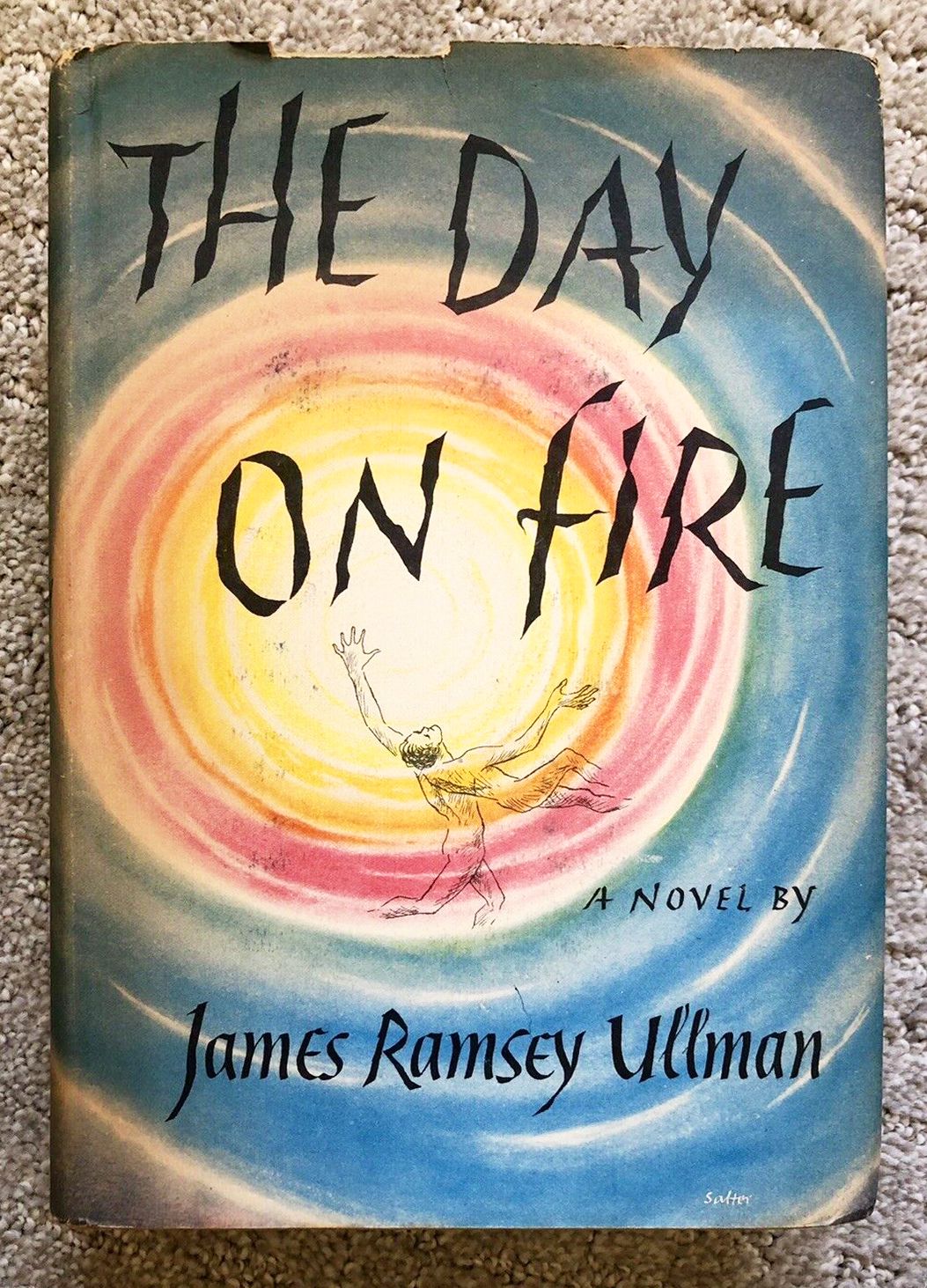c/o James Ramsey Ullman
Dear The Day on Fire,
There is so much I want to say to you, I don’t know where to begin. First, I thank you (and maybe my friends curse you) for introducing me to the joy of thinking like a poet. After we met, immediately everything looked different. For a while now, I’ve wanted to practice detailed observation (probably from reading Anthony Doerr), but I couldn’t quite get the hang of it. But then, you came and showed me exactly how. Not just by writing, but by showing me your way of responding to your observations and playing with words, in little fragments.
“...where, rhyming in these shadowy fantastic places
as if I played a lyre, I'd gently pluck the laces
of my burst boots, one foot pressed tight against my heart...”
Of course, my observations are not quite so eloquent.
“Oh light switch
that does nothing,
Are you satisfied
in your rest?
Or is there yearning
behind
that blank white facade?”
My excuse is I’m trying to keep the bar low and not suck the fun out of it—clearly I’m not a true poet like our poor dear main character Claude.
Oh, Claude. I relate so much to his attention to the inner life, and how hard it is to articulate. Not only for the sake of poetry and art, but for the simple sake of feeling understood and valued for who you are by the people in your life.
“But it was just talk, boys’ gabble, with no meaning, no reference to the life he lived within. With his schoolmates, as with his family, there was a wall, a barrier, and through that barrier could pass only trivialities, jokes, gripes, swearwords, never the inward reality of what was truly themselves.”
“I know a lot of boys and young men. They’re all well brought up and have nice manners, and some of them pay a lot of attention to me; but that’s all there is—there’s nothing inside of them. Inside of you there’s so much—so wonderfully much—and nothing comes out at all—except in your writing. If you could only give to other people the littlest bit of what you give to your writing.”
Writing becomes a coping mechanism to address the problem of belonging. If you can finally figure out how to put words to what is inside of you, maybe you can join that “outer life” everyone else seems so fluent in.
“All right, he was different. He was the queer one. The outcast, the vagabond, the voyager on strange seas. He saw things that others did not see; thought and felt things that were beyond their imaginings. Most of all he was different because the others—whatever was within them, whatever the truth beneath the lies and pretenses—kept it locked away and hidden, whereas he could not rest, could scarcely live and breathe, unless he poured them out in words. They were words, he already knew, to which few would listen—or, listening, understand. …There was one thing that would listen, though—that he could make listen—and that was paper. Pencil would speak, and paper would listen, and he held them as naturally as others held a knife for whittling or a stone for throwing—or held a girl in their arms in the Bois d’Amour.”
“For years, already, he had worked at the technique of writing. He had written prose and verse, narrative and lyric. He had tried all manner of verse forms: ode and sonnet, triolet and rondeau, rondel and villanelle, alexandrine and sestina. He had experimented with meter, rhyme, nonrhyme, alliteration, onomatopoeia; with all the tricks and skills and traditions of the poet’s craft, until he was able to use them as he pleased. Now, however, he was no longer interested in forms and techniques, and least of all in tradition. They were prison walls, and he scaled them. They were rubble, and he threw them away. All his concentration, his dedication was to the expression of the inward; of what lay within himself—and himself alone.”
For a writer, a poet, whose great fulfillment is to articulate truth, it’s a tragedy to be misunderstood by almost everyone. Why is this such a struggle? Why are the ones with the deepest need to communicate also the ones who struggle the most to do so?
“I shall not speak, I shall not show my heart, but still, within that heart, a fire will burn. Far, far I’ll go, alone, a wanderer, and life, the wide earth itself, will be my love.”
But none of us can be alone forever, can we? We all seek out the ones we can find our home with, wherever they may be.
“What he was seeking were still different faces: faces with beards, with gaunt cheeks, with wild hair, with flashing eyes: the poets, painters, philosophers, men of art, of song, of vision, who, he knew, had also, among all the others, made this world of Montmartre their own. What he would do when he found them he did not know. Nor did it matter. It would be enough, now, simply to find; to watch them, be near them, and by that nearness to become, in a fashion, one with them.”
This search for expression and belonging joins up with the artist’s search for truth. There’s a tendency to vacillate between different, often-extreme modes of finding it, every time thinking “this is it... finally!” And then, of course, disappointment, depression, and the revival of a faint hope as the search continues.
“The truth was not always pleasant. It did not always have good manners and clean its fingernails. Sometimes it was in the eyes of a child or in a bird on a treetop, sometimes in a gutter, on a gallows, in a barracks latrine; and it was no less the truth in one place than in another. The dedication was to find it in all places—everywhere. To face it, know it, and be unafraid.”
The search is endless. We try so hard to put words to the truth of existence, going beyond the dream of success or safety or fame or whatever we're all chasing on this earth. “Can’t we see how silly and fake this all is?” our inner artist wants to scream. But all along, we live in our own dream—that we are different, that we are alone, that the inner life is separate from the outer, that this unavoidable separation keeps us from the connection we long for.
It’s so easy to see it in Claude, that what ultimately keeps him from articulating the truth is not that writing is torture, or that a writer’s life is toxic, or that he is alone, or that everyone else is not able to see what he sees—it’s his own mirage of self. He believes too much in his own narrative. He can’t escape it for even a moment to see that this whole wide world outside himself is not outside himself—that he’s a part of everything, and everything is a part of him.
It’s excruciating because it’s so recognizable. And again, I thank you. It’s a gift to be shown all the ways the story you’re telling yourself is always only a half-truth. Maybe even one percent of the truth. There is so much more to take in, and to know, just by opening yourself up to the people around you (however dangerous that may feel).
Thank you again for our adventures together. You took me around the whole world with Claude in all his searching, and what I found at the end of it is almost too good for words: a bravery, to face not just a harsh world, but something even harsher—my own unreliable narrator.
Fondly,
Sarah Avenir
P.S. If you’ve not yet read The Day on Fire by James Ramsey Ullman, consider this the formal introduction you’ve been waiting for. Especially if you’re an artist and/or know the experience of inner turmoil (creative or otherwise), I think you’ll get along splendidly together.
P.P.S. In the spirit of POSSE, this was also published on Mastodon, Twitter, and Instagram.
Sarah Avenir is a writer, reader, and aspiring hermit who invented a holiday involving pretend mail. You can read more letters she’s written to books she’s loved at lovenotetoabook.substack.com.


